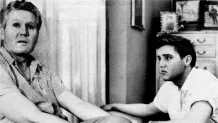Introduction:
Elvis Presley’s “Don’t Cry Daddy” is a poignant ballad that touches the heartstrings of listeners with its emotional depth and sincerity. Released in 1969 as a part of his album “Elvis in Memphis,” the song explores themes of loss, resilience, and the enduring bond between a father and child.
From the gentle strumming of the guitar to Elvis’s soulful vocals, “Don’t Cry Daddy” captivates audiences from the very first note. The song tells the story of a young child comforting their grieving father after the loss of their mother, offering words of reassurance and love in the face of sorrow.
As Elvis sings the heartbreaking refrain, “Don’t cry, Daddy, Daddy, please,” listeners are transported into the intimate world of a family grappling with loss and longing for solace. The sincerity and vulnerability in Elvis’s voice make the song feel deeply personal, resonating with anyone who has experienced the pain of losing a loved one.
The powerful emotion conveyed in “Don’t Cry Daddy” is further amplified by the lush orchestration and heartfelt lyrics, creating a truly unforgettable musical experience. Through his heartfelt performance, Elvis showcases his ability to connect with listeners on a profound level, eliciting empathy and understanding.
As one of Elvis’s most moving ballads, “Don’t Cry Daddy” continues to touch the hearts of fans around the world, serving as a timeless reminder of the power of love, resilience, and the enduring strength of family bonds.

Did you know?
“Don’t Cry Daddy” was recorded by Elvis Presley at American Sound Studio in Memphis, Tennessee, on January 15, 1969, during his legendary Memphis sessions.
The song was included on Elvis’s album “From Elvis in Memphis,” which was released in June 1969 and marked his return to recording in Memphis after several years of focusing on movie soundtracks.
Elvis’s performance of “Don’t Cry Daddy” received critical acclaim, with many praising his heartfelt rendition and the emotional depth he brought to the song.
The single version of “Don’t Cry Daddy” features a spoken bridge where Elvis addresses his son directly, assuring him that he’s “still his buddy.”
“Don’t Cry Daddy” peaked at number six on the Billboard Hot 100 chart and reached the top spot on the Billboard Easy Listening chart, becoming one of Elvis’s most successful singles of the late 1960s.
The song’s themes of loss and resilience struck a chord with audiences, and it remains a beloved favorite among Elvis fans worldwide.
“Don’t Cry Daddy” has been covered by various artists over the years, including Tom Jones, Neil Diamond, and Bobby Vinton, among others.
The song’s emotional impact was further heightened by Elvis’s live performances, where he often dedicated it to his own father, Vernon Presley, who had recently passed away.
“Don’t Cry Daddy” showcases Elvis’s versatility as a vocalist, demonstrating his ability to convey raw emotion and connect with listeners on a profound level.
With its timeless message of love, loss, and hope, “Don’t Cry Daddy” continues to be cherished by fans and remains an enduring part of Elvis Presley’s musical legacy.
Video:
Lyrics:
Today I stumbled from my bedWith thunder crashing in my headMy pillow still wetFrom last night’s tearsAnd as I think of giving upA voice inside my coffee cupKept crying outRinging in my earsDon’t cry, daddyDaddy, please don’t cryDaddy, you’ve still got me and little TommyAnd together we’ll find a brand new mommyDaddy, daddy, please laugh againDaddy, ride us on your back againOh, daddy, please, don’t cryWhy are children always firstTo feel the pain and the hurt the worst?It’s true but somehowIt just don’t seem right‘Cause every time I cry, I knowIt hurts my little children, so I wonderWill it be the same tonight?Don’t cry, daddyDaddy, please don’t cryDaddy, you’ve still got me and little TommyAnd together we’ll find a brand new mommyDaddy, daddy, please laugh againDaddy, ride us on your back againOh, daddy, please, don’t cryOh, daddy, please don’t cry